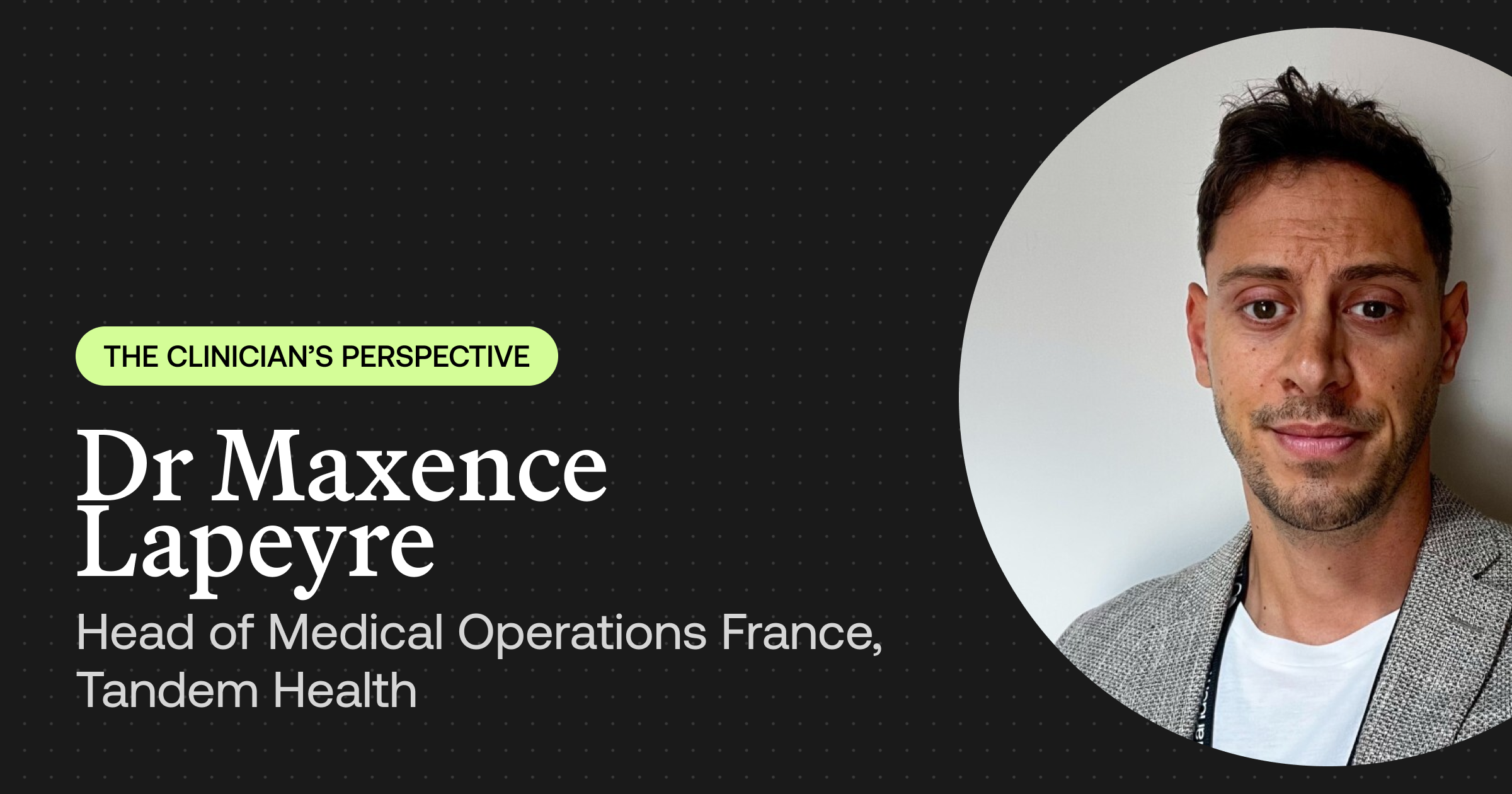September 11, 2025
September 24, 2025

This article is part of our series, The Clinician’s Perspective, where we explore the intersection of AI and healthcare through the eyes of our team – former clinicians who understand the realities of patient care firsthand.
I still remember the start of my surgical residency, all the stress of having to care for patients, examine them, treat them, and do it all in a very short amount of time. Between surgeries, staff meetings, consultations, hospitalized patients, and prescriptions to write… I remember often skipping lunch just to be sure I could finish everything. And when you’re 1.84m tall and weigh 82 kilos, skipping lunch doesn’t exactly help you stay efficient for the rest of the day.
But to my surprise, the stress didn’t really come from the medical side or from the patients. It came from having to fill out medical records, write everything down, always writing… I felt like I spent more time in front of the computer documenting patients than I did actually being with them. Whether it was taking notes, writing consultation reports or discharge summaries, everything had to be tracked, everything had to be written, or else I risked being “called out” by my supervisors at the next staff meeting. The time it took felt endless, especially with EMR software that was slow and ridiculously complex.
See the patient, talk with them, examine them, jot down notes on a piece of paper, then later go to the computer to fill in their file. And that’s in the best-case scenario, when no one has interrupted you in the meantime, forcing you to fill in the file an hour later while trying to remember the consultation. Writing up the record by trying to decipher half-legible notes scrawled on a scrap of paper in your pocket, all the while afraid of forgetting something important.
The fear of forgetting a detail.
That fear… The fear of not being good enough because your mind is overloaded with hundreds of little tasks you’re trying not to forget. The fear of disappointing your supervisors. The fear of forgetting critical information about a patient. The fear of making a mistake that could lead to the wrong dose of treatment.
And we wonder why burnout is so common…
What a stress, always wondering if you forgot something, losing so much time on administrative work and managing files instead of spending it with patients. Patients who need that medical presence, who need to feel that we are truly there for them in their moments of doubt and pain. Studies show we spend up to 40% of our time on admin instead of focusing on care. I remember running from room to room, sometimes listening to a patient for less than a minute, telling myself I had to get all their files updated before the next surgery or staff meeting.
If only AI had existed back then…
AI can assist conversations between doctors and patients by taking notes for you. It makes you stop worrying about whether you’ll forget a detail when writing the report three hours later. It lets you be fully present with the patient instead of half-distracted by note-taking. It captures all the details and information, both what the patient shares and everything I say – explanations, instructions, care plans, everything.
I can’t imagine consulting today without an AI-based medical assistant. Having that administrative load lifted from my shoulders, being able to truly be with the patient instead of in front of a computer writing, has turned my consultations into real moments of connection. I feel like I’m finally just doing medicine, caring, helping.
The very things that made me want to become a doctor in the first place.
I would have loved to take more time – time to listen to patients, hear their fears and anxieties, hold their hand for more than five seconds.
I would have liked to have complete patient records ready for staff meetings without it taking up four hours of my day.
I could have had more time to actually learn medicine.
And above all, I would have liked to be less afraid… That constant fear of forgetting an important detail that haunts you throughout those five years of residency.
Today in 2025, thanks to AI, there’s a way to do things differently, to do them better.
I still think of the young medical residents struggling to manage their stress…
Stay strong! An AI solution exists, it’s here for you.
I hope hospitals will adopt AI soon. The burnout of young doctors can partly be avoided. We must learn from past mistakes and from the stories told by so many physicians and former residents, so we don’t repeat them.
As Winston Churchill said, “Those who fail to learn from history are doomed to repeat it.”
Dr Maxence Lapeyre is an ophthalmic surgeon specializing in the treatment of retinal diseases. He has worked in several university hospitals in France and for one year led the ophthalmology department at a teaching hospital in the French overseas territories.
Before joining Tandem, Maxence worked as a medical advisor for private companies developing healthcare facilities. His deep knowledge of the French healthcare system and secondary care organization led him to take on the role of Head of Medical Operations for France at Tandem Health.
If you want to connect with Maxence, you can reach him on Linkedin or reach out at maxence.lapeyre@tandemhealth.ai.
Slut dig til tusindvis af klinikere, der nyder stressfri dokumentation.